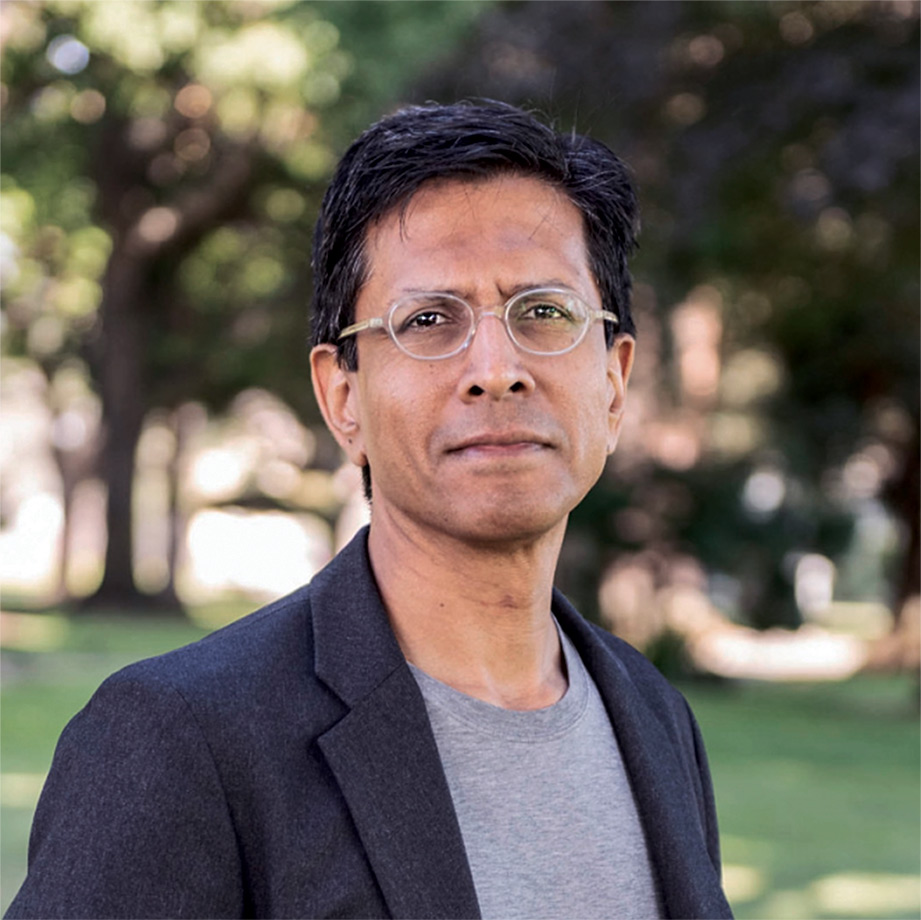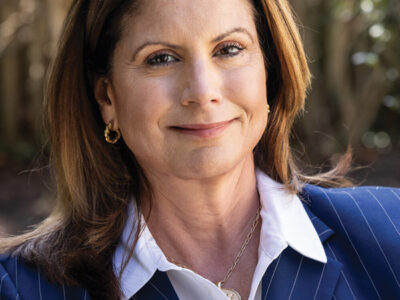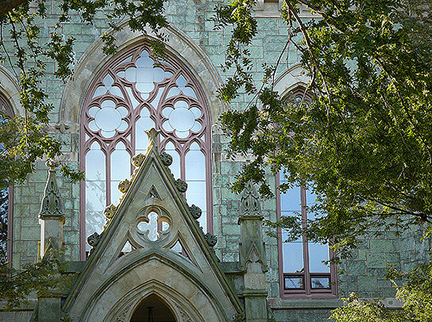
A fierce believer in the value of universities to society and a defender of academic freedom, Penn’s new volunteer leader is determined to ensure that “no one is afraid to be who they are” on campus.
When he arrived at Penn from India as a freshman, Ramanan Raghavendran EAS’89 W’89 LPS’15 was struck by the exposure to students of different backgrounds from across the US and the world. “I had never met a single Jewish person. I had met maybe one Muslim child in fifth grade. And I think I knew one Christian person who was in the Indian Air Force with my dad,” he says. “And it was just interesting to see the shared humanity. I made friends across all categories and boundaries, and this has really shaped who I am.”
Raghavendran was elected chair of Penn’s board of trustees in early January, after a semester of controversy that culminated in the resignations of former board chair Scott Bok C’81 W’81 L’84 and President Liz Magill.
A Penn trustee since 2014, Raghavendran was named chair of the local, national, and global engagement committee in 2020 before becoming a member of the executive committee in 2022. That same year he was named chair of the board of advisors for the School of Arts and Sciences, after having been a member since 2012. Other volunteer activities include service on the board of the Center for the Advanced Study of India (CASI) and as global coordinator for the Penn Alumni Ambassador Program. Outside of Penn, his volunteer involvements include SF Goodwill and Magic Bus, which works with 500,000 at-risk children in South Asia.
He “thought long and hard” before taking on the role of board chair. But he considers Penn a “civilizational artifact—one of a handful of great universities that define America, and American culture and society. And I felt I had something to offer at this time,” he says. “To help bridge gaps and bring people together and remind us of our purpose—treasuring academic freedom, yet ensuring that our discourses are civil, and no one is afraid. So that was a complicated set of agenda items. But I think that’s the job of a board chair and, even more so, it’s the job of the president.”
In a statement, Penn Interim President J. Larry Jameson called Raghavendran an “inspired and inspiring choice” as board chair, pointing to his three Penn degrees, varied leadership roles, and “professional experience in a rapidly changing business environment.” Board Vice Chair Julie Beren Platt C’79, who had served as interim chair, praised Raghavendran as “someone who listens with intention and invests deeply in relationships.”
“This is a moment when the role of a board and the role of trustees in a great academic institution is getting attention, not just at Penn but in many other places,” Raghavendran says. “At the end of the day, the thing for trustees to remember is that, unlike other boards we have at Penn, which are advisory in nature, the board of trustees is the sole fiduciary body. And with that comes your classical definitions of fiduciary duty: the duty of care, the duty of loyalty, the duty of obedience. These are all things that we should know and do and exercise.
“And that is the prosaic answer: We defend the endowment, we oversee a presidential search, we exercise our fiduciary duties. We communicate our questions, concerns, suggestions to the president and the provost, who run the University in the framework of shared governance with the faculty leadership that we have.”
In this “complicated place,” the president, provost, faculty, students, and administrative staff all have roles to play, he says. “And in these respects and others, it is unlike anything else. It is unlike a for-profit command-and-control company. It is unlike a parliament. It is its own beast. It’s got its own rules. And the good news for everybody is that it changes and evolves, but on a timeline that we all need to be patient [with].”
Raghavendran praises Jameson for “immediately prioritiz[ing]” the Action Plan for Combating Antisemitism and the Presidential Commission on Countering Hate and Building Community, first announced by Magill last fall, following his appointment in December. “We are on a much quicker timeline to see and then act on recommendations than we were on before. And I would really look to Larry for his leadership as president, in a sense, to make all these things happen,” Raghavendran says.
“Just to be clear how I feel: We must privilege academic freedom, but we must also ensure that we’re a campus where no one is afraid to be who they are,” he adds. “And antisemitism is a great and ancient evil. And I think we need to crush it on our campus.”
Raghavendran, whose father was a fighter pilot in the Indian Air Force, grew up on military bases in northern India and New Delhi. He always did well in school and was accepted into several of the “more interesting colleges” in India. But the Indian educational system holds fast to a “very examination-driven, non-holistic view of how you progress in life,” he says, and when a relative living in the US suggested he consider college in the States he decided to pursue the option.
The application process back then was still largely paper-based, “with the added complexity of being half a planet away,” he recalls. He applied to five US schools, got accepted by four, and ended up in Philadelphia “in large part because Penn had a really nice brochure,” he says. It also helped that he was interested in computer science and Penn’s department, “even in that time, was viewed very favorably,” he recalls. “I said, ‘This is what I want to do,’ and my life was changed in that instant.”
Raghavendran has spent three decades in the world of venture capital and growth equity investments with a variety of companies. Currently the managing partner and cofounder of Amasia, a global venture capital firm focused on climate and sustainability, he admits he didn’t give much thought to Penn for the first 15 years or so after graduation. “Life was just full, and I had a career and so on.” But then, “I realized how much of the good that had happened in my life came from that decision to go to Penn,” he says. “I sought ways of giving back.”
He reconnected with Penn first through a fellow alumnus who introduced him to CASI, “which provided a psychological link.” That led to more alumni involvement, focused mostly on the School of Arts and Sciences. “My work life is full of technology and business, and I really wanted my Penn engagement to be very different from my day job.” His Wharton and Engineering degrees hadn’t left much time for electives, he notes. “I’m a voracious reader. I’m interested in lots of things. Arts and Sciences is the most sprawling of all our schools. It touches every aspect of human endeavor, from biology to economics to history, and I felt getting engaged with SAS just opened up this new vista of knowledge and intellectual ferment—and so it has.”
The motivation was similar when he earned a master’s degree from Penn’s School of Liberal and Professional Studies, with the added benefit of a structured course of study. “The MLA was mentioned to me, and it felt like a lightning bolt had hit my head, because it is essentially a part-time degree in the humanities for working professionals.” Now based in San Francisco, he’s pursuing a similar degree from Stanford.
Though it’s less high-profile than his other roles, Raghavendran says his “deepest and most time consuming” involvement has been with the Penn Alumni Ambassador Program, formerly known as the alumni interview program, which goes back 14 years. Designed to match alumni and prospective students for a conversation about themselves and the University, it is “by far Penn’s biggest alumni volunteer engagement program,” he says. “I get a lot out of it, in a few different ways. One, it’s an amazing way for alumni to give back and be engaged. Second, it really shows Penn in its best light to tens of thousands of applicants. And third, there is value in it for our admissions team. So it’s been inordinately rewarding. And even as recently as last year and the year before, I’ve been doing lots of interviews. It’s one of my favorite activities.”
Raghavendran
brings what he has called a “slightly demented
fervor” to his advocacy for higher education. “If you’re an
American, you should be able to realize how much these institutions have
contributed and will continue to contribute to the greatness of the United
States,” he says.
“I think universities like Penn are a very important part of what makes us
great and has made us grow.”
One “very tangible” example was last year’s Nobel Prize in Medicine awarded to Katalin Kariko and Drew Weissman [“Gazetteer,” Nov|Dec 2023], which he calls “the most consequential Nobel Prize in decades” and a “world-changing discovery” that saved millions of lives and trillions of dollars. “And it all happened at Penn from start to finish. And by the way, I think there are more Nobel Prizes waiting and scattered around the University,” he adds. “I think these great universities are great for America. And we should nurture and cherish them.”
Though Raghavendran listed hiring presidents as among the board’s duties, he and his fellow trustees are in no hurry to further exercise that responsibility at present. “We’re happy beyond happy that [Jameson] is there, and there is no real thought being given to the timeline” for the next presidential search, he says. “You obviously cannot have an interim president forever. We can acknowledge that. There will be a process and there will be great candidates. But I think for now, you know, Larry’s not a caretaker—he is an action-oriented human being, and he’s taking lots of actions I feel good about.” —JP




